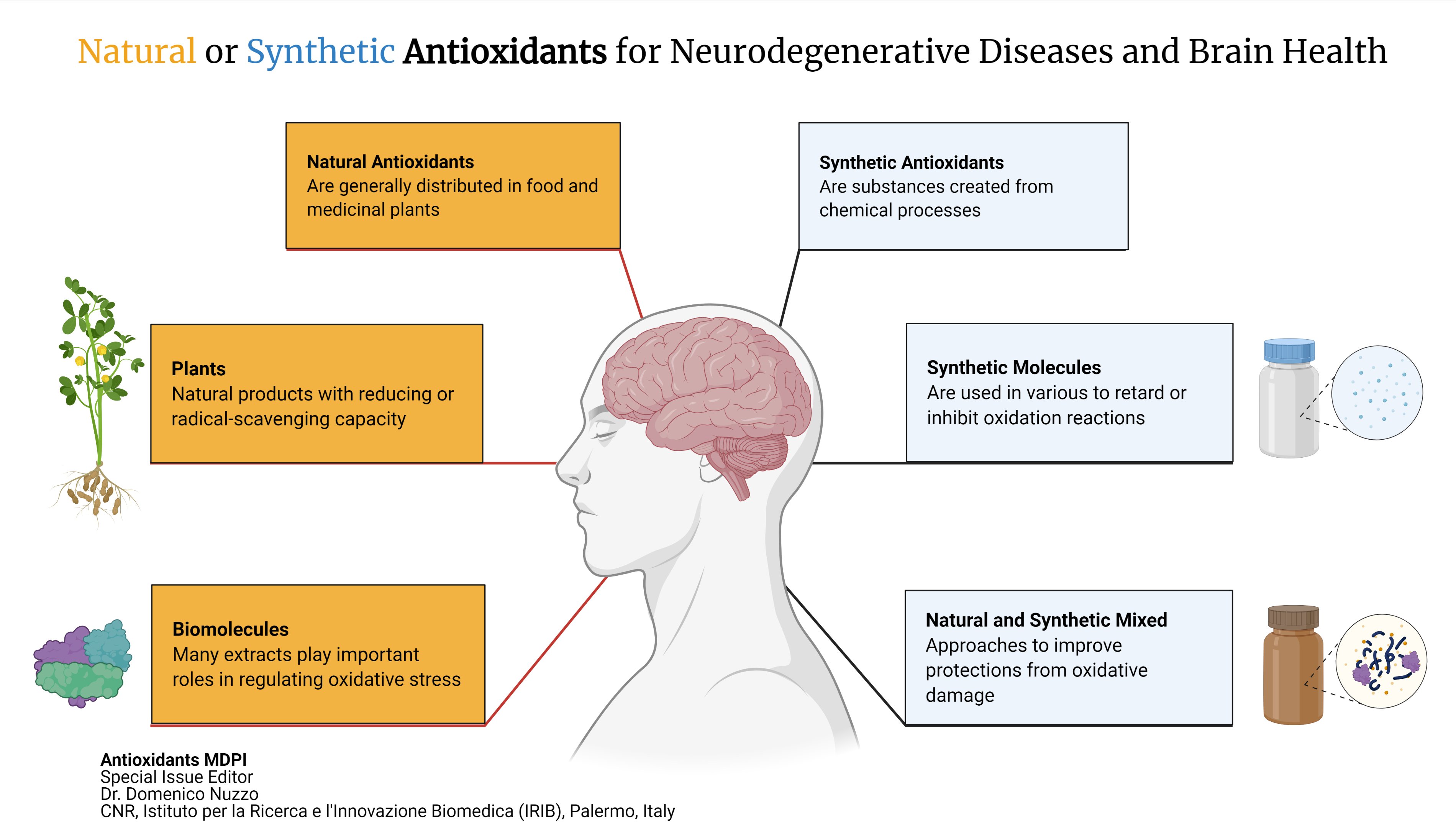Natural or Synthetic Antioxidants for Neurodegenerative Diseases and Brain Health
A special issue of Antioxidants (ISSN 2076-3921). This special issue belongs to the section "Natural and Synthetic Antioxidants".
Deadline for manuscript submissions: closed (15 November 2021) | Viewed by 142467
Special Issue Editor
Interests: mechanisms of neurodegeneration; mitochondrial dysfunction; high-fat diet mice model; natural antioxidants; functional foods
Special Issues, Collections and Topics in MDPI journals
Special Issue Information
Dear Colleagues,
Neurological diseases have increased over the last decade and numerous researchers are focused on identifying drugs that can prevent, slow down or treat these diseases. Brain homeostasis is essential for normal central nervous system (CNS) activity, and one of the key factors contributing to CNS impairment is oxidative stress. This type of stress strongly contributes to the degeneration of brain areas and/or accelerates neuronal cell damage. Furthermore, the brain is highly susceptible to oxidative stress due to its high oxygen consumption and lipid rich content and its structures are, therefore, fragile to this insult. Thus, oxidative stress-induced brain damage has a strong potential to negatively influence normal CNS functions. Oxidative stress has historically been considered to be primarily involved in neurodegenerative disorders, such as Alzheimer's, Huntington's and Parkinson's diseases, and its involvement in neuropsychiatric disorders, including anxiety disorders and depression, must be further investigated. Several natural and/or synthetic antioxidants, used alone or in blend, have been proposed to complement and/or assist traditional pharmacological treatment of neurodegenerative disorders. Oxidative stress and its consequences, such as mitochondrial dysfunction, apoptosis, excitotoxicity, and the misfolding of proteins are among the main targets of the bioactive molecules, although the mechanisms by which these compounds exert their beneficial effects are still unclear.
Therefore, authors are invited to present original research articles, review papers, clinical case reports or communications focused on the effects that natural or synthetic antioxidants have at CNS level. It is important to highlight that, if antioxidant sources are used as extracts of recognized antioxidant properties whose whole composition is unknown, the chemical characterization of the compounds, through techniques such as HPLC, MS, LC–MS, HPLC–MS, and NMR, should be included in the article. On the contrary, if the authors use sources already identified, the chemical characterization is not required. Chemical–physical results, biological characterization or clinical aspects of these bioactive molecules are welcome.

Dr. Domenico Nuzzo
Guest Editor
Manuscript Submission Information
Manuscripts should be submitted online at www.mdpi.com by registering and logging in to this website. Once you are registered, click here to go to the submission form. Manuscripts can be submitted until the deadline. All submissions that pass pre-check are peer-reviewed. Accepted papers will be published continuously in the journal (as soon as accepted) and will be listed together on the special issue website. Research articles, review articles as well as short communications are invited. For planned papers, a title and short abstract (about 100 words) can be sent to the Editorial Office for announcement on this website.
Submitted manuscripts should not have been published previously, nor be under consideration for publication elsewhere (except conference proceedings papers). All manuscripts are thoroughly refereed through a single-blind peer-review process. A guide for authors and other relevant information for submission of manuscripts is available on the Instructions for Authors page. Antioxidants is an international peer-reviewed open access monthly journal published by MDPI.
Please visit the Instructions for Authors page before submitting a manuscript. The Article Processing Charge (APC) for publication in this open access journal is 2900 CHF (Swiss Francs). Submitted papers should be well formatted and use good English. Authors may use MDPI's English editing service prior to publication or during author revisions.
Keywords
- Bioactive molecules
- Neurodegeneration
- Neuroinflammation
- Diet Longevity
- Obesity
- Reactive oxygen and nitrogen species
- DNA damage
- Mitochondria
- Brain health
- Neurocognitive diseases
- Alzheimer’s disease
- Parkinson’s disease
- Traumatic brain injury
Benefits of Publishing in a Special Issue
- Ease of navigation: Grouping papers by topic helps scholars navigate broad scope journals more efficiently.
- Greater discoverability: Special Issues support the reach and impact of scientific research. Articles in Special Issues are more discoverable and cited more frequently.
- Expansion of research network: Special Issues facilitate connections among authors, fostering scientific collaborations.
- External promotion: Articles in Special Issues are often promoted through the journal's social media, increasing their visibility.
- e-Book format: Special Issues with more than 10 articles can be published as dedicated e-books, ensuring wide and rapid dissemination.
Further information on MDPI's Special Issue polices can be found here.






